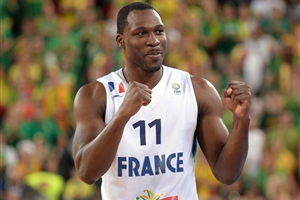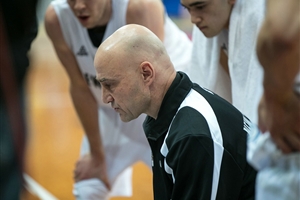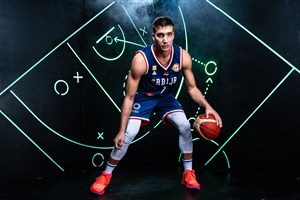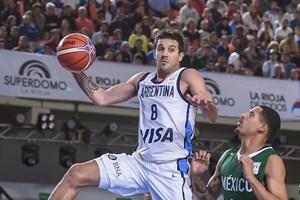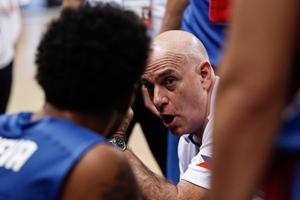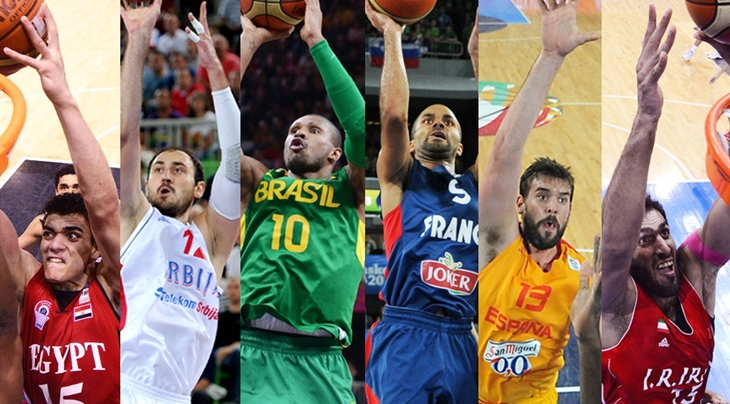
FIBA - A glance at Spain 2014's Group A
BARCELONA (FIBA Basketball World Cup) - There will be no secrets when Spain, Serbia and France oppose each other in the Preliminary Round of the 2014 FIBA Basketball World Cup in Granada.
The three are in Group A following Monday night's draw in Barcelona, along with Brazil, Iran and Egypt.
The Spanish, French and Serbians have engaged in memorable battles in recent times, be it at EuroBaskets, Olympics or World Championships, and adding to the familiarity is that leading players of the teams clash regularly in European club competitions.
Spain v France has turned into one of the biggest rivalries in international basketball, with the teams having squared off in each of the last five years.
In 2009, the Spaniards were a few years removed from their world title triumph in Japan when Pau Gasol and Rudy Fernandez led them to victory over an unbeaten French team in the Quarter-Finals en route to their first European championship.
France prevailed in their clash the following year in the Preliminary Round of the 2010 FIBA World Championship in Turkey.
However, Spain dominated their two meetings at EuroBasket 2011 in Lithuania, one of them in the Gold Medal Game, and then piled further misery on the French at the 2012 Olympics with a gritty, narrow win in the last eight.
Les Bleus, led by tournament MVP Tony Parker, beat their nemesis in a Semi-Final classic last year at the EuroBasket in Slovenia before capturing the crown for the first time.
Who can forget the titanic games between Serbia and Spain in 2009 and the following year?
Spain lost to the Serbians in the opening round at the EuroBasket in Poland but then blew them out in the Final.
In 2010, however, Milos Teodosic buried a long three-pointer at the buzzer to shock the defending champions in the Quarter-Finals at the World Championship in Turkey.
Serbia beat France last year at the EuroBasket.
South American heavyweights Brazil should know what to expect in their battles against the European teams because over the years, a lot of their stars have been on the books of leading sides in Spain.
Brazilian point guard Marcelinho Huertas, in fact, is currently a Barcelona backcourt mate of Spanish great Juan Carlos Navarro.
Brazil defeated Spain, 88-82, at the London Olympics.
After Saturday's announcement that the country had received a wild card to play at the World Cup, Brazil center Tiago Splitter tweeted : "Muchas ganas de jugar la Copa del mundo en Espanha!! Estoy convencido que sera especial! Muchos de nosotros hemos jugado o juegan alla!"
Translated into English, Splitter's tweet says: "Looking forward to playing at the World Cup in Spain! I am convinced that it will be special. Many of us have played or play there."
Asian champions Iran faced European teams at the 2008 Olympics and 2010 FIBA World Championship. In the latter of those tournaments, the Iranians also faced Brazil. Perhaps more important, their coach is Slovenian Memi Becirovic and he will offer a lot of insight into the games with the European giants and Brazil.
Becirovic coached Slovenia at the 2010 FIBA World Championship and led them to Preliminary Round victories over Brazil and Iran.
Here's a brief look at each team.
Spain (FIBA Ranking Men: No. 2)
As the hosts and No. 2 side in the FIBA Ranking Men, Spain go into the World Cup with lofty aims. Eight years on from their terrific run to gold in Japan, the protagonists remain the same. They are Pau Gasol, the MVP of the 2006 tournament, and Barcelona icon Juan Carlos Navarro. The dynamic duo, along with big men Felipe Reyes and Serge Ibaka, took the 2013 summer off from national team duty but will strengthen a squad led by coach Juan Antonio Orenga. There will be no shortage of options in the backcourt with Jose Calderon, Sergio Rodriguez, Sergio Llull and Ricky Rubio bringing flair, quickness and toughness in abundance, while Rudy, set to play an 11th consecutive summer with the senior team, remains a game-changer on both ends of the floor. A signature play of Spain is Rodriguez to Rudy for the alley-oop jam. The Spaniards are going to be tough for any team to beat.
Serbia (FIBA Ranking: No. 11)
A country that has produced many of the greatest players in European hoops history will have one of them at the helm of the national team, former point guard Aleksandar Djordjevic. The successor to Dusan Ivkovic, Djordjevic won gold medals for the former Yugoslavia and will now have a baptism of fire in the international coaching arena. Teodosic, Dusko Savanovic and other established national team were sorely missed last year when Serbia impressed early at the EuroBasket but then pulled out all stops just to finish seventh and claim the last qualifying spot for the World Cup. Djordjevic is revered by the players, and the fans, but calling the shots from the sideline will be different from doing so as the floor general. Serbia are betting on Djordjevic and now he has to deliver.
France (FIBA Ranking: No. 8)
The celebrations are still going on in Paris after Les Bleus' title triumph in Slovenia, but winning a medal in Spain may be a tougher proposition for Vincent Collet's squad. There will be an abundance of talent, and experience, in the squad but someone other than Antoine Diot and Tony Parker needs to shine in the backcourt. Might the guard who can be a source of points be Nando de Colo? Will the likely return of Fabien Causeur strengthen the backcourt? Should Collet bring sharpshooter and 2012-13 French League MVP Edwin Jackson back into the fold for additional firepower? The contributions of veterans Boris Diaw and Florent Pietrus will be vital. France have to be ready from the off because their first two games are against Brazil and Serbia.
Brazil (FIBA Ranking: No. 10)
Coming off a nightmare 2013 when numerous leading players missed the 2013 FIBA Americas Championship and Brazil lost all of its opening round games, the national team's image that had started to shine bright under coach Ruben Magnano lost some of its luster. If at full strength, with Leandro Barbosa, Tiago Splitter, Anderson Varejao and Nene returning to the fold, there is no reason why the South Americans cannot challenge for a spot on the podium. To go far in the World Cup, however, Brazil would appear to need a first - or second-place finish to avoid a first knockout game against the likely top two teams in Group B, Argentina and Greece. The Argentinians have been particularly troublesome for Brazil, beating them in a do-or-die Eighth-Final at the 2010 FIBA World Championship, the 2011 FIBA Americas Championship Final and the Quarter-Finals of the 2012 Olympics. Greece were one of the teams to beat Brazil at the 2006 FIBA World Championship and prevent them from advancing from the initial group phase.
Iran (FIBA Ranking: No. 20)
Do not be surprised if the FIBA Asia Championship winners have a breakthrough summer and progress from the first round. Coach Memi Becirovic firmly believes this is something his team can achieve, citing the team's size, talent and ability to play defense. The biggest challenge, according to the Slovenian play-caller, is overcoming self-doubt. Iran defeated Tunisia in 2010 and will be favored against Egypt this time, so they will need to beat Spain, Serbia, France or Brazil to realize their aim of advancing. Arsalan Kazemi will return to the squad, Becirovic has confirmed, after being left out in 2013 when he was concentrating on the launch of his professional career. Veterans Hamed Hadadi, Samad Nikkhah Bahrami, Hamed Afagh and Mahdi Kamrany were the team's leading scorers in their title winning side last summer in the Philippines and remain influential for the Iranians.
Egypt (FIBA Ranking: No. 46)
Not since 1994 in Canada have Egypt played at a FIBA World Championship, and their reappearance on the big stage has taken many people by surprise. Finishing runners-up to Angola at last year's AfroBasket was certainly an achievement that few could have predicted. In the previous two AfroBasket appearances, Egypt had come in 10th and 11th. And they lost all three of their Preliminary Round games at the AfroBasket in Abidjan, Cote d'Ivoire, albeit by close margins. When their AfroBasket and World Cup qualifying lives depended on it, however, Egypt excelled. Getting a terrific contribution during the entire tournament from 21-year-old center Assem Marei, a player at Minnesota State in American college basketball, Coach Amr Aboul-Kheir engineered wins against defending champions Tunisia (77-67) and Cape Verde (74-73) and then, with a chance to reach the World Cup, his side defeated Senegal (70-63). The 2.04m Marei will be an undersized pivot when he goes up against the likes of the Gasol brothers of Spain, Pau (2.14m) and Marc (2.16m), Brazil's Splitter (2.11m) and France's Alexis Ajinca (2.15m). Even so, there is no such thing as a guaranteed win in international basketball so Spain, Serbia, France, Brazil and Iran had better be fully concentrated in all of their games, including against Egypt.
FIBA






